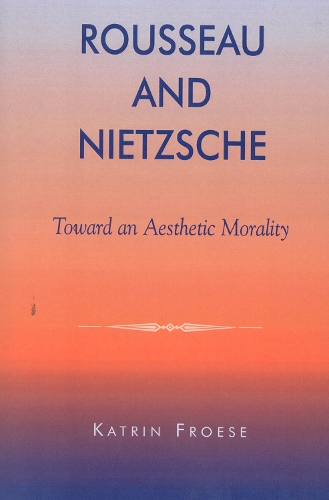
Rousseau and Nietzsche: Toward an Aesthetic Morality
(Paperback)
Publishing Details
Rousseau and Nietzsche: Toward an Aesthetic Morality
By (Author) Katrin Froese
Bloomsbury Publishing PLC
Lexington Books
24th January 2002
United States
Classifications
Tertiary Education
Non Fiction
Political science and theory
Social and political philosophy
Philosophy: aesthetics
320.01
Physical Properties
Paperback
216
Width 152mm, Height 228mm, Spine 17mm
322g
Description
This is a depiction of the problems and potential of modernity through the words of two of its most poignant voices. It focuses upon the modern self's desire to individuate whilst facing the ethical responsibility to integrate with the world. Katrin Froese juxtaposes Nietzsche's drive for extraordinary individualism with Rousseau's call for the dependable citizen. She finds that where Nietzsche's aesthetism embraces the limitless and irreconcilable longings of a divided being, Rousseau's approach emphasizes the impositions of limits to ensure harmony and contentment prevail. However, she does not belabour their differences on the question of modernity but discusses the similarity at the heart of Rousseau's notion of morality and Nietzsche's aestheticism; the moral vision that underlies Nietzsche's notion of art and the aesthetic understanding prevalent in Rousseau's moral system.
Reviews
Froese's interpretations of Rousseau and Nietzsche provide depth and subtlety to their respective accounts of self-making. -- Mark E. Warren, Professor of Political Science, University of British Columbia
Katrin Froese provides a genuinely instructive and imaginitive study of the rapport between Rousseau and Nietzsche. Students and scholars in political theory, the history of ideas, and philosophy will learn a great deal from this book, which is both lucidly written and deftly argued. -- Keith Ansell-Pearson, professor of philosophy and director of graduate research, University of Warwick, England
Froese has brought together the thinker that may be said to initiate modernity and the one that may be said to announce its end. Without covering over their differences, she shows how strikingly similar they are. In an age when the public realm is no longer or but slightly available, Nietzsche and Rousseau may very well be, as Froese shows, our best guides. -- Tracy B. Strong, Professor of Political Thought and Philosophy, University of Southampton
. . . [A] stimulating and valuable discussion. * Canadian Journal of Political Science *
. . . interesting and useful as an introduction to the two great thinkersand an easy read at that. * Political Studies Review *
Froese has written a lucid account of the projects of Rousseau and Nietzsche. . . . Her book will help to clear up many confusions associated with these two names. -- Kathleen Higgins, University of Texas at Austin
Author Bio
Katrin Froese is Assistant Professor of Political Science at the University of Calgary.
